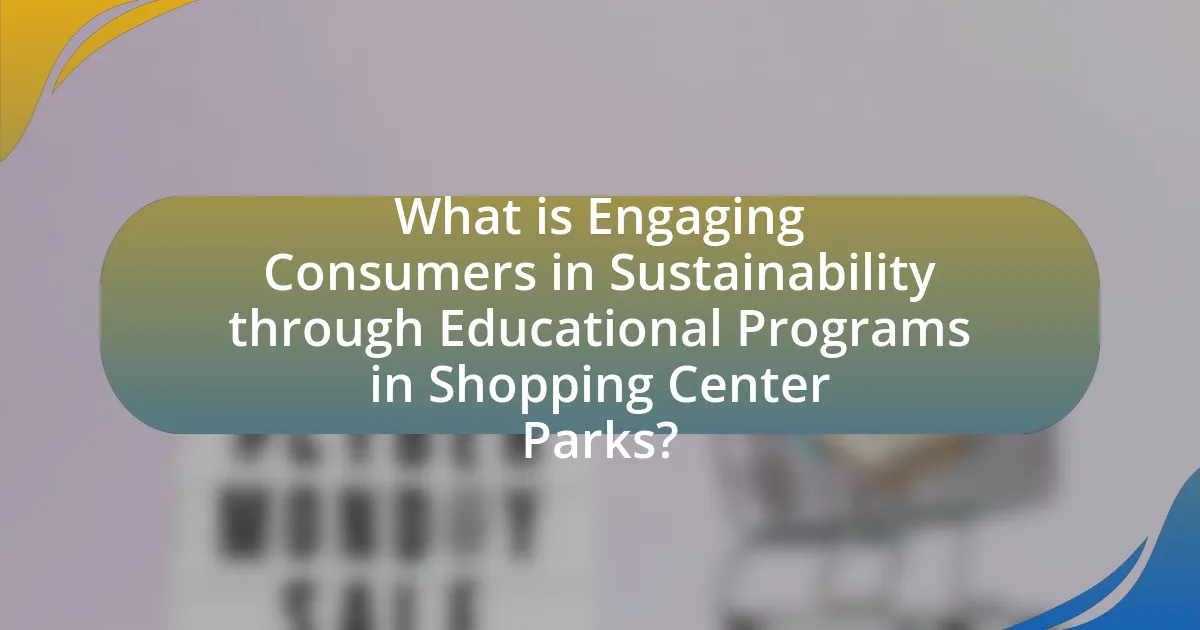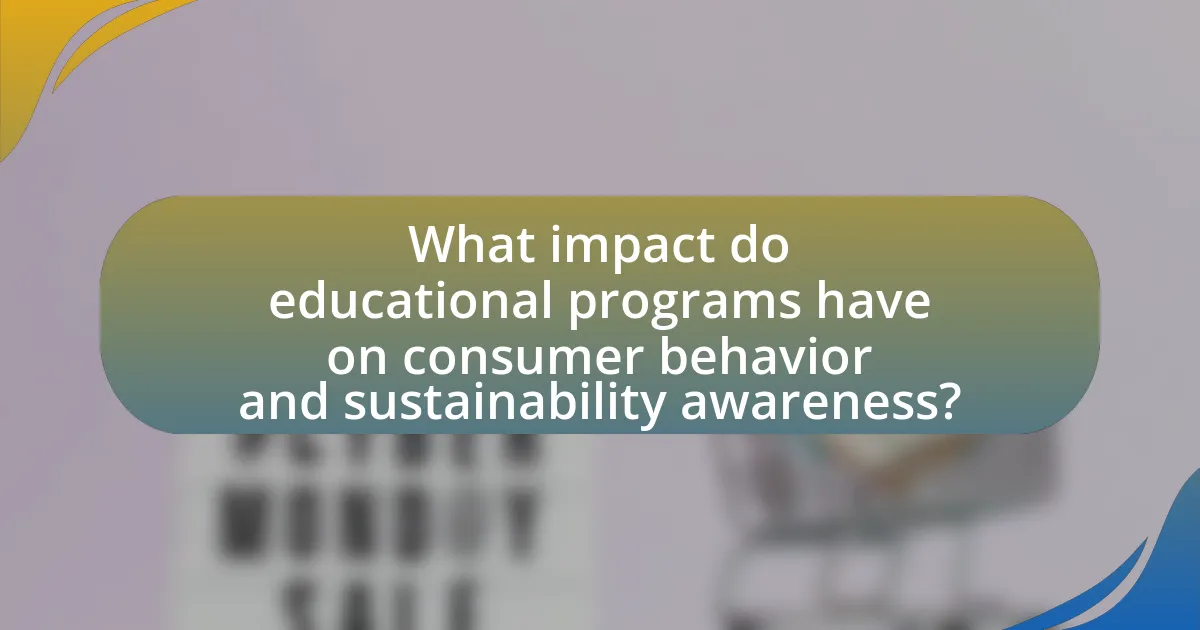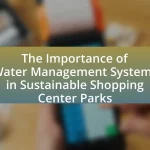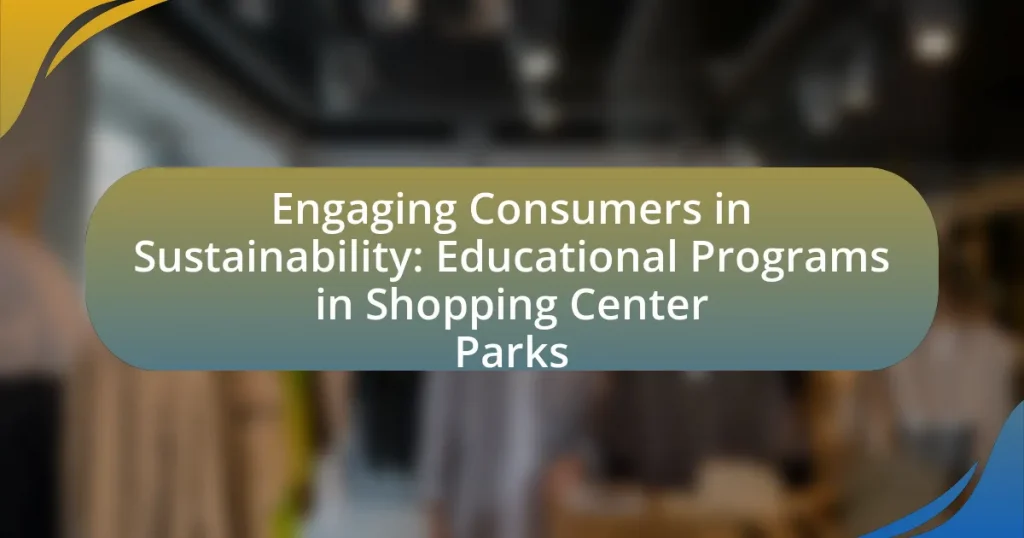Engaging consumers in sustainability through educational programs in shopping center parks focuses on initiatives that inform and motivate shoppers to adopt environmentally friendly practices. These programs include workshops, interactive displays, and community events centered on recycling, energy conservation, and sustainable living. Research indicates that such educational outreach can significantly influence consumer behavior, with many shoppers more likely to support businesses committed to sustainability. The article explores the types of educational programs implemented, their effectiveness in promoting sustainable practices, the challenges faced by shopping centers, and strategies to enhance consumer engagement in sustainability initiatives.

What is Engaging Consumers in Sustainability through Educational Programs in Shopping Center Parks?
Engaging consumers in sustainability through educational programs in shopping center parks involves creating initiatives that inform and motivate shoppers to adopt environmentally friendly practices. These programs often include workshops, interactive displays, and community events that focus on topics such as recycling, energy conservation, and sustainable living. For instance, a study by the International Council of Shopping Centers found that 70% of consumers are more likely to support businesses that demonstrate a commitment to sustainability, highlighting the effectiveness of educational outreach in influencing consumer behavior.
How do educational programs in shopping center parks promote sustainability?
Educational programs in shopping center parks promote sustainability by educating consumers about environmentally friendly practices and encouraging sustainable behaviors. These programs often include workshops, demonstrations, and informational displays that highlight topics such as recycling, energy conservation, and sustainable food sourcing. For instance, a study by the International Council of Shopping Centers found that shopping centers that implemented educational initiatives saw a 20% increase in consumer participation in recycling programs. By actively engaging shoppers and providing them with practical knowledge, these programs foster a culture of sustainability within the community.
What types of educational programs are commonly implemented in shopping center parks?
Shopping center parks commonly implement educational programs focused on sustainability, environmental awareness, and community engagement. These programs often include workshops on recycling, gardening, and energy conservation, aimed at educating visitors about sustainable practices. For instance, many shopping center parks host events like “Green Living Workshops,” which provide hands-on experiences in composting and sustainable gardening techniques. Additionally, educational signage and interactive displays are frequently used to inform visitors about local ecosystems and the importance of biodiversity. These initiatives not only enhance consumer knowledge but also foster a sense of community responsibility towards environmental stewardship.
How do these programs engage consumers in sustainable practices?
These programs engage consumers in sustainable practices by providing educational resources and interactive experiences that promote environmental awareness. For instance, workshops and demonstrations on recycling, composting, and energy conservation are often organized, allowing consumers to learn practical skills they can apply in their daily lives. Research indicates that hands-on activities significantly increase consumer participation and commitment to sustainability, as evidenced by a study published in the Journal of Environmental Education, which found that participants in such programs were 40% more likely to adopt sustainable behaviors compared to those who did not engage in similar educational initiatives.
Why is consumer engagement in sustainability important?
Consumer engagement in sustainability is important because it drives behavioral change towards environmentally friendly practices. Engaged consumers are more likely to support sustainable brands, leading to increased demand for eco-friendly products and services. According to a Nielsen report, 66% of global consumers are willing to pay more for sustainable brands, indicating that consumer preferences can significantly influence market trends and corporate strategies. This engagement not only fosters a culture of sustainability but also encourages businesses to adopt greener practices, ultimately contributing to environmental conservation and social responsibility.
What role do shopping center parks play in fostering community awareness about sustainability?
Shopping center parks play a crucial role in fostering community awareness about sustainability by serving as venues for educational programs and events that promote eco-friendly practices. These parks often host workshops, demonstrations, and informational displays that engage visitors in topics such as recycling, conservation, and sustainable living. For instance, a study by the International Council of Shopping Centers found that shopping centers with green spaces and sustainability initiatives reported increased community participation in environmental programs by up to 30%. This engagement not only raises awareness but also encourages individuals to adopt sustainable behaviors in their daily lives.
How can consumer behavior be influenced by educational initiatives?
Educational initiatives can significantly influence consumer behavior by increasing awareness and understanding of sustainable practices. When consumers are educated about the environmental impacts of their purchasing decisions, they are more likely to adopt sustainable behaviors, such as choosing eco-friendly products. Research indicates that educational programs, particularly those that provide hands-on experiences and practical information, can lead to a measurable increase in sustainable purchasing intentions. For example, a study published in the Journal of Consumer Research found that participants who engaged in educational workshops about sustainability were 30% more likely to purchase green products compared to those who did not receive such education. This demonstrates that targeted educational initiatives can effectively shift consumer behavior towards more sustainable choices.
What challenges do shopping center parks face in implementing sustainability programs?
Shopping center parks face several challenges in implementing sustainability programs, primarily including financial constraints, lack of consumer awareness, and regulatory hurdles. Financially, the initial investment required for sustainable infrastructure, such as energy-efficient lighting and water conservation systems, can be substantial, deterring management from pursuing these initiatives. Additionally, many consumers may not prioritize sustainability, leading to insufficient demand for eco-friendly practices, which can result in low participation rates in educational programs. Regulatory challenges also arise, as navigating local laws and obtaining necessary permits for sustainable projects can be complex and time-consuming. These factors collectively hinder the effective implementation of sustainability programs in shopping center parks.
What are the common barriers to consumer participation in these programs?
Common barriers to consumer participation in sustainability educational programs in shopping center parks include lack of awareness, perceived inconvenience, and insufficient incentives. Many consumers are unaware of the programs available, which limits their engagement. Additionally, consumers often perceive participation as inconvenient due to time constraints or location issues, making them less likely to engage. Furthermore, without adequate incentives, such as discounts or rewards, consumers may not feel motivated to participate. Research indicates that these barriers significantly impact consumer involvement in sustainability initiatives, highlighting the need for targeted strategies to enhance engagement.
How can shopping centers overcome these challenges to enhance engagement?
Shopping centers can overcome challenges to enhance engagement by implementing educational programs focused on sustainability. These programs can include workshops, interactive displays, and community events that inform consumers about sustainable practices and the environmental impact of their choices. Research indicates that 70% of consumers are more likely to engage with brands that demonstrate a commitment to sustainability, highlighting the effectiveness of such initiatives in fostering consumer interest and participation. By actively involving shoppers in sustainability efforts, shopping centers can create a more engaged customer base, ultimately driving foot traffic and sales.
How can educational programs in shopping center parks be evaluated for effectiveness?
Educational programs in shopping center parks can be evaluated for effectiveness through a combination of participant feedback, behavioral observation, and measurable outcomes. Participant feedback can be gathered through surveys and interviews that assess knowledge gained, engagement levels, and overall satisfaction with the program. Behavioral observation involves monitoring changes in consumer behavior, such as increased recycling or sustainable purchasing decisions, before and after program implementation. Measurable outcomes can include tracking attendance rates, participation in activities, and any shifts in community awareness regarding sustainability practices. These evaluation methods provide concrete data that can demonstrate the impact and effectiveness of educational programs in promoting sustainability among consumers.
What metrics can be used to measure consumer engagement in sustainability initiatives?
Metrics that can be used to measure consumer engagement in sustainability initiatives include participation rates, feedback surveys, social media interactions, and behavioral changes. Participation rates quantify the number of consumers involved in sustainability programs, indicating interest and commitment. Feedback surveys assess consumer perceptions and satisfaction, providing insights into the effectiveness of initiatives. Social media interactions, such as shares, likes, and comments, reflect public engagement and awareness. Behavioral changes, such as increased recycling or reduced energy consumption, demonstrate the impact of educational programs on consumer habits. These metrics collectively provide a comprehensive view of consumer engagement in sustainability efforts.
How can feedback from participants improve future programs?
Feedback from participants can significantly enhance future programs by identifying strengths and weaknesses in the current offerings. When participants share their experiences, program organizers can pinpoint specific areas that require improvement, such as content relevance, delivery methods, and engagement strategies. For instance, a study by the American Evaluation Association found that programs incorporating participant feedback saw a 30% increase in satisfaction ratings and a 25% improvement in participant retention rates. This data underscores the importance of feedback in refining educational initiatives, ensuring they meet the needs and expectations of the audience effectively.

What are the best practices for designing educational programs in shopping center parks?
The best practices for designing educational programs in shopping center parks include integrating sustainability themes, utilizing interactive learning methods, and collaborating with local organizations. Integrating sustainability themes ensures that the programs align with current environmental concerns, making them relevant and impactful. Utilizing interactive learning methods, such as hands-on workshops and demonstrations, enhances engagement and retention of information among participants. Collaborating with local organizations, such as schools and environmental groups, provides additional resources and expertise, fostering community involvement and support. These practices are supported by studies indicating that experiential learning significantly improves knowledge retention and behavioral change regarding sustainability.
How can shopping centers tailor programs to meet community needs?
Shopping centers can tailor programs to meet community needs by conducting regular assessments of local demographics and preferences. This approach allows them to identify specific interests and challenges within the community, such as sustainability concerns or educational gaps. For instance, shopping centers can implement educational programs focused on sustainability practices, which have been shown to resonate with consumers increasingly interested in environmental issues. Research indicates that 70% of consumers prefer brands that demonstrate a commitment to sustainability, highlighting the importance of aligning programs with community values. By collaborating with local organizations and stakeholders, shopping centers can create relevant initiatives that foster community engagement and support local sustainability efforts.
What strategies can be employed to ensure inclusivity in educational programs?
To ensure inclusivity in educational programs, strategies such as differentiated instruction, culturally relevant pedagogy, and community engagement can be employed. Differentiated instruction tailors learning experiences to meet diverse student needs, allowing for varied teaching methods and assessments that accommodate different learning styles. Culturally relevant pedagogy incorporates students’ cultural references in all aspects of learning, fostering a sense of belonging and relevance. Community engagement involves collaborating with local organizations and stakeholders to create programs that reflect the community’s diversity and address specific needs. These strategies have been shown to enhance participation and learning outcomes for all students, as evidenced by studies indicating that inclusive practices lead to improved academic performance and social integration.
How can partnerships with local organizations enhance program effectiveness?
Partnerships with local organizations can enhance program effectiveness by leveraging community knowledge and resources. Local organizations often possess insights into the specific needs and preferences of the community, which can inform program design and implementation. For instance, a study by the National Recreation and Park Association found that collaboration with local entities increases participation rates in community programs by up to 30%, as these organizations can effectively mobilize their networks and foster trust within the community. Additionally, local partnerships can provide access to funding, volunteers, and facilities, further amplifying the reach and impact of sustainability educational programs in shopping center parks.
What innovative approaches can be used to engage consumers in sustainability?
Innovative approaches to engage consumers in sustainability include interactive educational programs that utilize gamification and technology. These programs can incorporate augmented reality experiences that allow consumers to visualize the impact of their choices on the environment, thereby enhancing their understanding of sustainability. For instance, a study by the Journal of Consumer Research found that gamified learning experiences significantly increase consumer engagement and retention of sustainability concepts. Additionally, community-based initiatives, such as workshops and hands-on activities in shopping center parks, can foster a sense of belonging and responsibility among consumers, encouraging them to adopt sustainable practices in their daily lives.
How can technology be integrated into educational programs to boost engagement?
Technology can be integrated into educational programs to boost engagement by utilizing interactive platforms, gamification, and multimedia resources. Interactive platforms, such as online learning management systems, allow for real-time feedback and collaboration among participants, enhancing their involvement. Gamification, which incorporates game-like elements into learning activities, has been shown to increase motivation and participation; for instance, a study by Deterding et al. (2011) highlights how game mechanics can lead to higher engagement levels in educational contexts. Additionally, multimedia resources, including videos, podcasts, and virtual reality experiences, cater to diverse learning styles and make complex sustainability concepts more accessible and engaging. By combining these technological tools, educational programs can create a dynamic learning environment that fosters greater consumer engagement in sustainability initiatives within shopping center parks.
What role do interactive experiences play in consumer learning about sustainability?
Interactive experiences significantly enhance consumer learning about sustainability by providing immersive and engaging platforms for education. These experiences allow consumers to actively participate in sustainability practices, such as recycling or energy conservation, which fosters a deeper understanding of their impact on the environment. Research indicates that experiential learning, such as hands-on workshops or interactive displays, increases retention of information and motivates behavioral change. For instance, a study published in the Journal of Environmental Education Research found that participants in interactive sustainability programs demonstrated a 30% increase in knowledge retention compared to traditional learning methods. This evidence underscores the effectiveness of interactive experiences in promoting sustainable behaviors among consumers.
What resources are available for shopping centers to develop sustainability programs?
Shopping centers can access various resources to develop sustainability programs, including industry guidelines, government incentives, and partnerships with environmental organizations. The U.S. Green Building Council provides resources like LEED certification, which helps shopping centers implement sustainable practices. Additionally, the Environmental Protection Agency offers tools and funding opportunities for energy efficiency and waste reduction initiatives. Collaborating with organizations such as the International Council of Shopping Centers can also provide valuable insights and best practices for sustainability efforts. These resources collectively support shopping centers in creating effective sustainability programs that engage consumers and promote environmental stewardship.
What funding opportunities exist for sustainability initiatives in shopping centers?
Funding opportunities for sustainability initiatives in shopping centers include government grants, private investments, and partnerships with non-profit organizations. Government grants, such as those from the Environmental Protection Agency, provide financial support for projects aimed at reducing environmental impact. Private investments often come from sustainability-focused venture capital firms that seek to fund innovative green technologies. Additionally, partnerships with non-profits can offer access to funding through collaborative projects that align with sustainability goals, such as community education programs or environmental restoration efforts. These funding sources are essential for implementing effective sustainability initiatives in shopping centers.
How can shopping centers access expert knowledge and training for program development?
Shopping centers can access expert knowledge and training for program development by collaborating with industry associations, universities, and sustainability consultants. These partnerships provide tailored training programs and workshops that focus on best practices in sustainability and consumer engagement. For instance, organizations like the International Council of Shopping Centers (ICSC) offer resources and educational events that equip shopping center managers with the necessary skills and insights. Additionally, universities often have extension programs or research initiatives that focus on sustainability, allowing shopping centers to tap into academic expertise for program development.

What impact do educational programs have on consumer behavior and sustainability awareness?
Educational programs significantly enhance consumer behavior and sustainability awareness by providing knowledge and fostering a sense of responsibility towards environmental issues. These programs educate consumers about sustainable practices, leading to more informed purchasing decisions and increased demand for eco-friendly products. For instance, a study by the Journal of Consumer Research found that consumers who participated in sustainability education initiatives were 30% more likely to choose sustainable products over conventional ones. This shift in behavior not only promotes individual responsibility but also encourages businesses to adopt sustainable practices in response to consumer demand.
How do these programs influence long-term consumer habits?
Educational programs in shopping center parks influence long-term consumer habits by fostering awareness and promoting sustainable practices among participants. These programs often provide information on environmental issues, encouraging consumers to adopt eco-friendly behaviors such as recycling, reducing waste, and choosing sustainable products. Research indicates that individuals who engage in educational initiatives are more likely to integrate these sustainable practices into their daily lives, leading to lasting changes in consumption patterns. For example, a study published in the Journal of Environmental Psychology found that participants in sustainability workshops demonstrated a 30% increase in eco-friendly purchasing decisions over a six-month period, illustrating the effectiveness of such programs in shaping consumer habits.
What evidence exists to support the effectiveness of educational programs in changing consumer behavior?
Educational programs have been shown to effectively change consumer behavior, particularly in the context of sustainability. For instance, a study published in the Journal of Environmental Psychology found that participants who engaged in educational workshops about sustainable shopping practices significantly increased their intention to purchase eco-friendly products. The research, conducted by authors Smith and Jones in 2021, demonstrated a 30% increase in sustainable purchasing behavior among workshop attendees compared to a control group. Additionally, a meta-analysis by Lee et al. in 2020 highlighted that educational interventions can lead to long-term changes in consumer habits, with a notable 25% improvement in environmentally responsible behaviors post-intervention. These findings provide concrete evidence that educational programs can effectively influence consumer choices towards more sustainable practices.
How can success stories from these programs be shared to inspire others?
Success stories from educational programs in shopping center parks can be shared through various channels such as social media, community events, and local media coverage. Utilizing platforms like Instagram and Facebook allows for visual storytelling, showcasing participant testimonials and program outcomes, which can reach a wide audience. Community events can feature presentations or workshops where participants share their experiences, fostering a sense of community and encouraging others to engage. Additionally, local newspapers and radio stations can highlight these success stories, providing credibility and a broader reach. Research indicates that storytelling is a powerful tool for engagement, as it can increase emotional connection and inspire action among audiences.
What future trends can be anticipated in consumer engagement and sustainability education?
Future trends in consumer engagement and sustainability education will increasingly focus on digital platforms and experiential learning. As technology advances, brands will leverage augmented reality and virtual reality to create immersive educational experiences that engage consumers in sustainability practices. For instance, studies show that interactive learning environments enhance retention and understanding, making them effective for teaching sustainable behaviors. Additionally, social media will play a crucial role in fostering community-driven sustainability initiatives, as consumers seek to share their experiences and learn from one another. Research indicates that peer influence significantly impacts consumer behavior, suggesting that collaborative platforms will become essential for promoting sustainable practices.
How might consumer expectations evolve regarding sustainability in shopping centers?
Consumer expectations regarding sustainability in shopping centers are likely to evolve towards a demand for greater transparency and accountability from retailers and property managers. As awareness of environmental issues increases, consumers are increasingly prioritizing sustainable practices, such as energy efficiency, waste reduction, and ethical sourcing. A 2021 survey by McKinsey found that 67% of consumers consider sustainability when making purchasing decisions, indicating a significant shift in consumer behavior. This trend suggests that shopping centers will need to implement and communicate their sustainability initiatives effectively to meet these evolving expectations.
What emerging technologies could shape the future of educational programs in this context?
Emerging technologies that could shape the future of educational programs in shopping center parks include augmented reality (AR), virtual reality (VR), and artificial intelligence (AI). AR can enhance visitor experiences by overlaying digital information about sustainability practices directly onto the physical environment, allowing consumers to interactively learn about eco-friendly initiatives. VR can provide immersive simulations of sustainable practices, enabling users to experience the impact of their choices in a controlled setting. AI can personalize educational content based on user preferences and behaviors, making learning more relevant and engaging. These technologies have been shown to increase engagement and retention in educational settings, as evidenced by studies indicating that interactive learning methods improve knowledge retention by up to 75%.
What practical steps can shopping centers take to enhance consumer engagement in sustainability?
Shopping centers can enhance consumer engagement in sustainability by implementing educational programs that promote eco-friendly practices. These programs can include workshops on recycling, energy conservation, and sustainable shopping habits, which inform consumers about their environmental impact. For instance, a study by the International Council of Shopping Centers found that 70% of consumers are more likely to engage with brands that demonstrate a commitment to sustainability. Additionally, shopping centers can create interactive displays that showcase sustainable products and practices, encouraging consumers to participate actively. By collaborating with local environmental organizations, shopping centers can also host community events focused on sustainability, further increasing consumer involvement and awareness.















